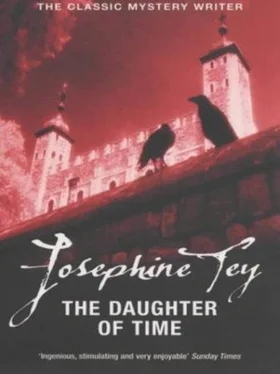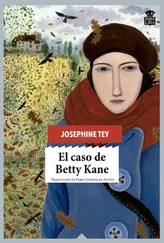‘Merciful Heaven!’ said Marta, pausing with a delft jar in one hand and a glass cylinder in the other, and looking at him in wild surmise.
‘Do you think historians really listen to what they are saying?’
‘Who was the said Queen-Dowager?’
‘Elizabeth Woodville. Richard IV’s wife.’
‘Oh, yes. I played her once. It was a “bit”. In a play about Warwick the Kingmaker.’
‘Of course I’m only a policeman,’ Grant said.
‘Perhaps I never moved in the right circles. It may be that I’ve met only nice people. Where would one have to go to meet a woman who became matey with the murderer of her two boys?’
‘Greece, I should think,’ Marta said. ‘Ancient Greece.’
‘I can’t remember a sample even there.’
‘Or a lunatic asylum, perhaps. Was there any sign of idiocy about Elizabeth Woodville?’
‘Not that anyone ever noticed. And she was Queen for twenty years or so.’
‘Of course the thing is farce, I hope you see,’ Marta said, going on with her flower arranging. ‘Not a tragedy at all. “Yes, I know he did kill Edward and little Richard, but he really is a rather charming creature and it is so bad for my rheumatism living in rooms with a north light”.’
Grant laughed, and his good temper came back.
‘Yes, of course. It’s the height of absurdity. It belongs to Ruthless Rhymes, not to sober history. That is why historians surprise me. They seem to have no talent for the likeliness of any situation. They see history like a peepshow; with two-dimensional figures against a distant background.’
‘Perhaps when you are grubbing about with tattered records you haven’t time to learn about people. I don’t mean about the people in the records, but just about People. Flesh and blood. And how they react to circumstances.’
‘How would you play her?’ Grant asked, remembering that the understanding of motive was Marta’s trade.
‘Play who?’
‘The woman who came out of sanctuary and made friends with her children’s murderer for seven hundred merks per annum and the right to go to parties at the Palace.’
‘I couldn’t. There is no such woman outside Euripides or a delinquent’s home. One could only play her as a rag. She’d make a very good burlesque, now I think of it. A take-off of poetic tragedy. The blank verse kind. I must try it sometime. For a charity matinée, or something. I hope you don’t hate mimosa. It’s odd, considering how long I’ve known you, how little I know of your likes and dislikes. Who invented the woman who became buddies with her sons’ murderer?’
‘No one invented her. Elizabeth Woodville did come out of sanctuary, and did accept a pension from Richard. The pension was not only granted, it was paid. Her daughters went to parties at the Palace and she wrote to her other son – her first-marriage son – to come home from France and make his peace with Richard. Oliphant’s only suggestion as to the reason for this is that she was either frightened of being dragged out of sanctuary (did you ever know of anyone who was dragged out of sanctuary? The man who did that would be excommunicated – and Richard was a very good son of Holy Church) or that she was bored with sanctuary life.’
‘And what is your theory about so odd a proceeding?’
‘The obvious explanation is that the boys were alive and well. No one at that time ever suggested otherwise.’
Marta considered the sprays of mimosa. ‘Yes, of course. You said that there was no accusation in that Bill of Attainder. After Richard’s death, I mean.’ Her eyes went from the mimosa to the portrait on the table and then to Grant. ‘You think, then, you really soberly think, as a policeman, that Richard didn’t have anything to do with the boys’ deaths.’
‘I’m quite sure that they were alive and well when Henry took over the Tower on his arrival in London. There is nothing that would explain his omission to make a scandal of it if the boys were missing. Can you think of anything?’
‘No. No, of course not. It is quite inexplicable. I have always taken it for granted that there was a terrific scandal about it. That it would be one of the main accusations against Richard. You and my woolly lamb seem to be having a lovely time with history. When I suggested a little investigation to pass the time and stop the prickles I had no idea that I was contributing to the rewriting of history. Which reminds me, Atlanta Shergold is gunning for you.’
‘For me? I’ve never even met her.’
‘Nevertheless she is looking for you with a gun. She says that Brent’s attitude to the B.M. has become the attitude of an addict to his drug. She can’t drag him away from it. If she takes him away from it physically, he spends the time harking back to it in his mind; so that she mightn’t exist as far as he is concerned. He has even stopped sitting through To Sea in a Bowl . Do you see much of him?’
‘He was here a few minutes before you came. But I don’t expect to hear from him again for some days to come.’
But in that he was wrong.
Just before supper-time the porter appeared with a telegram.
Grant put his thumb under the dainty Post Office lick on the flap and extracted two sheets of telegram. The telegram was from Brent.
Hell and damnation an awful thing has happened (stop) you know that chronicle in Latin I talked about (stop) the chronicle written by the monk at Croyland Abbey (stop) well I’ve just seen it and the rumour is there the rumour about the boys being dead (stop) the thing is written before Richard’s death so we are sunk aren’t we and I specially am sunk and that fine book of mine will never be written (stop) is anyone allowed to commit suicide in your river or is it reserved for the British.
Brent.
Into the silence the voice of the porter said: ‘It’s reply-paid, sir. Do you want to send an answer?’
‘What? Oh. No. Not right away. I’ll send it down presently.’
‘Very good, sir,’ said the porter looking respectfully at the two sheets of telegram – in the porter’s family a telegram was confined to one sheet only – and went away, not humming this time.
Grant considered the news conveyed with such transatlantic extravagance in the matter of telegraphic communication. He read the thing again.
‘Croyland,’ he said, considering. Why did that ring a bell? No one had mentioned Croyland so far in this case. Carradine had talked merely of a monkish chronicle somewhere.
He had been too often, in his professional life, faced with a fact that apparently destroyed his whole case to be dismayed now. He reacted as he would have reacted in a professional investigation. He took out the upsetting small fact and looked at it. Calmly. Dispassionately. With none of poor Carradine’s wild dismay.
‘Croyland,’ he said again. Croyland was somewhere in Cambridgeshire. Or was it Norfolk? Somewhere on the borders there, in the flat country.
The Midget came in with his supper, and propped the flat bowl-like plate where he could eat from it with a modicum of comfort, but he was not aware of her.
‘Can you reach your pudding easily from there?’ she asked. And as he did not answer: ‘Mr Grant, can you reach your pudding if I leave it on the edge there?’
‘ Ely! ’ he shouted at her.
‘What?’
‘Ely,’ he said; softly, to the ceiling.
‘Mr Grant, aren’t you feeling well?’
He became conscious of The Midget’s well-powdered and concerned little face as it intruded between him and the familiar cracks.
‘I’m fine, fine. Better than I’ve ever been in my life. Wait just a moment, there’s a good girl, and send a telegram down for me. Give me my writing-pad. I can’t reach it with that mess of rice pudding in the way.’
Читать дальше












